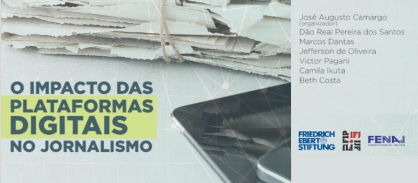"The impact of digital platforms on journalism"

Brasilia, Brazil.- “The impact of digital platforms on journalism” is the title of the electronic book that the National Federation of Journalists of Brazil (FENAJ, for its acronym in Portuguese) presented on Tuesday, May 18. The 106-page work brings together articles that address the political, economic and cultural impact of the world's Internet mega-corporations on the Brazilian journalistic ecosystem, in particular, digital business platforms and social networks.
The authorship of this work corresponds to journalists and researchers José Augusto Camargo (coordinator), Beth Costa, Camila Ikuta, Dão Real Pereira dos Santos, Jefferson Martins de Oliveira, Marcos Dantas and Victor Pagani. The publication is released with the support of the Friedrich Ebert Foundation.
The book aims to trace, in an interdisciplinary way, over seven chapters, the portrait of how the internet is structured in the country, its impact on contemporaneity, the consequences of its presence in society and, especially, its reflection in journalism . The organization of the work was in charge of the Director of Institutional Relations of FENAJ, José Augusto Camargo.
Despite the initial promise of being an area of freedom of opinion, the internet ended up being dominated by corporations such as Google, Apple, Facebook, Amazon and Microsoft. “These groups, who are not content producers themselves, but intermediaries and distributors of third-party production, paradoxically limit the scope and quality of information consumed by most people on the world wide web. One of the results of this contradiction is the weakening of the written press, ”the publication warns.
“With the emergence of social networks on the Internet, the advertising market has been shifting its investments from print to digital media. This caused a crisis in the financing model of the traditional press. Newspapers and magazines have been losing advertising space every year (…). Newspaper companies are closing, reducing their runs, reducing the number of workers, some end up closing print editions and are left exclusively with editions on the internet. And all this has initially impacted on the labor market of journalists, secondly, the financial health of companies, thirdly, it has a consequence on the very organization of Brazilian society because the information that is transmitted through the Internet does not It presents, in general, the same quality as that presented in the written press. The digital press lacks the work of judicious editing, selection and investigation, which is the essence of the professional journalist's work ”, comments the organizer of the publication.
At the end of the electronic book, the reader will contact the project proposed by the International Federation of Journalists (FIJ) - and assumed by FENAJ - to tax the large digital platforms, with the aim of establishing a fund to strengthen journalism and the appreciation of journalists. Both proposals are under study by FENAJ, which in mid-2020 formed a Working Group (WG) to address the issue.
For the president of FENAJ, María José Braga, it is the function of the public power (State) to guarantee quality citizen journalistic information. “It is quality information that produces citizenship. Therefore, public financing of journalistic production is essential. It must be transparent. And that is what FENAJ has been proposing with this project to create a fund to support and promote journalism ”, he points out.
“Google and Facebook have expanded their support and financing programs for new journalistic projects, but the big question is whether such specific initiatives are capable of solving structural problems caused by the predatory action of the platforms on journalism and on the work of the and journalists. With the proposal to tax them and create, with this collection, a fund to support journalistic activity, FIJ and FENAJ are directly confronting the so-called large technology companies, ”says Maria José Braga.
Drafting: SIGNIS ALC, with information from FENAJ






